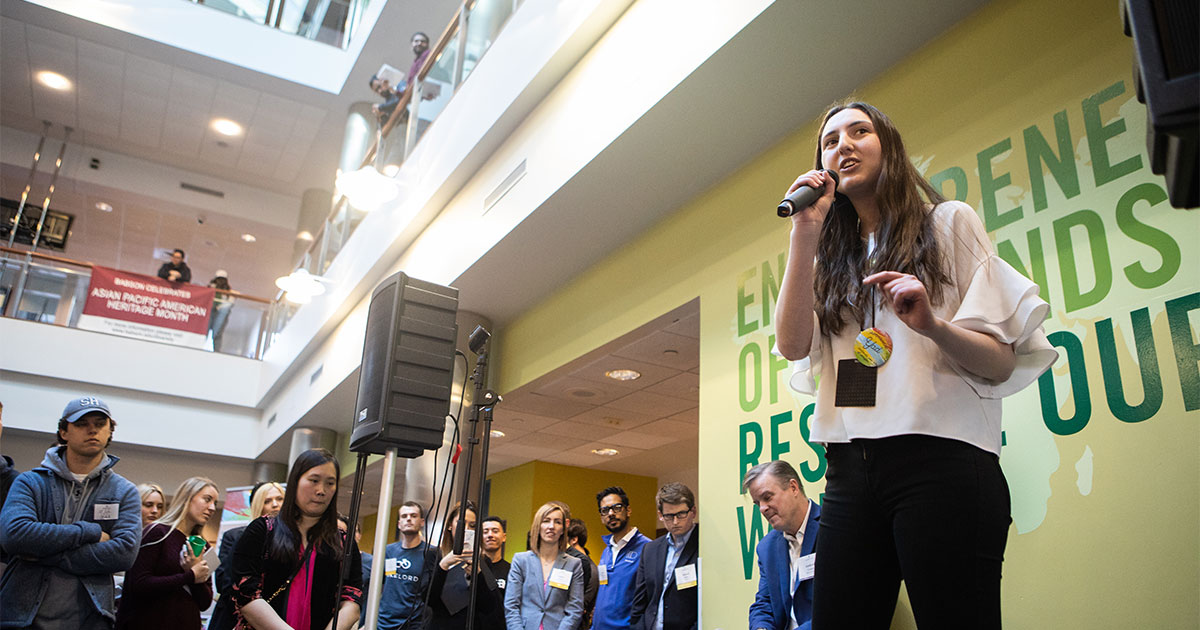How to Win the B.E.T.A. Challenge

The scrappiness of startups inspires Enrico Palmerino ’11.
When a more established business faces a challenge, it can pay for a solution to fix it. If there’s an issue with its website or inventory management or a host of other things, it can seek out whatever product or service is available in the market for help.
Startups, though, often don’t have that luxury. They may not have the resources to simply purchase a solution. Instead, they need to figure it out themselves.
To see that can-do, entrepreneurial spirit in action is a big reason Palmerino has enjoyed his time serving as a judge for Babson’s B.E.T.A. Challenge, an annual business competition presented by the College’s The Arthur M. Blank Center for Entrepreneurship. Being a judge has meant seeing the ingenuity and scrappiness of startups up close.
The semifinals of the 2022 B.E.T.A. Challenge are Wednesday, March 30. Register today.
“It’s a great reminder to approach problems from a creative and startup mindset,” says Palmerino, the founder and CEO of Botkeeper, a provider of automated bookkeeping services. “Sometimes the best, most cost-effective, and potentially scalable solution is one that you can build or piece together versus one that you buy off the shelf.”
The latest installment of the B.E.T.A. (Babson Entrepreneurial Thought & Action®) Challenge, in which ventures from Babson students and alumni compete for cash and prizes, is now underway. With the semifinals set for March 30, and the finale scheduled for April 14, we reached out to past judges of the contest, such as Palmerino, to see what advice they may have for this year’s contestants.
What makes for a business that could not only win the B.E.T.A. Challenge but also prove prosperous well into the future? Former judges had more than a few thoughts to offer.
Know How Much Money Is Needed
Catherine Friend White MBA’86 never misses a B.E.T.A. Challenge and has served as a judge multiple times. She enjoys watching ventures that have competed in the contest go on to grow and become even more successful. “I am a happy customer of several firms that were born at Babson,” says White, managing director of Golden Seeds, an early-stage investment firm focused on women-led businesses.
Her advice to B.ET.A. Challenge competitors: Don’t underestimate how much money you will need. “Know your numbers and have sensible assumptions to back them up,” she says. “Building a company almost always takes longer than planned, and it is disappointing to have a lack of initial funding be the reason a startup doesn’t make it.”
Why This Venture?
When assessing B.E.T.A. Challenge contestants, Gautam Gupta ’07, another former judge, first looks at their ventures’ value proposition, as well as the “why” behind the businesses.
“Why is this the business they are working on out of all the possible ideas out there?” says Gupta, a general partner at TCV, an investor in public and private companies in the technology industry. “I look for clarity of vision and purpose.”
“Be as realistic as you can be. Don’t oversell your capabilities. Don’t oversell your target market.”
Patrick Baird ’11, engagement manager at Lodestone Advisory Group
Be Realistic
The judges in the B.E.T.A. Challenge typically have much experience evaluating companies, so participants should keep that in mind when they’re pitching.
“Be as realistic as you can be. Don’t oversell your capabilities. Don’t oversell your target market,” says former judge Patrick Baird ’11, a Babson trustee and an engagement manager at Lodestone Advisory Group, a management consulting and venture capital firm. “The judges have experience. This is what they do in their day to day.”
For that reason, don’t try to dodge a judge’s question, no matter how tough it is. “Answer the question you are asked,” Baird says. “Be honest with where you are.”
Understand the Market
Sometimes, companies may have a great idea for a new product or service, but they haven’t done their homework on the potential market. “Unfortunately, they have gone ahead building a product or service for a market that they believe exists,” Palmerino says, “rather than doing some preliminary testing and having a true understanding of that market.”
Avoid “build it and they will come” scenarios, he says. Don’t assume customers will appear. Instead, conduct surveys and research. Try to understand just how many people out there actually are willing to pay for what you’re offering.
Realize that Data Isn’t Free
Be careful with data, or more specifically, be careful with where it comes from. Palmerino has seen ventures that have business models dependent on data scraped from sites such as TikTok or Facebook.
If they read those sites’ terms of service, the entrepreneurs would see that the data isn’t theirs to use, which means scaling their venture will be challenging. “The entrepreneur often underestimates the fact that the data they are aggregating is not actually their data,” he says. “And, getting that data in any other fashion in such an aggregate would be extremely expensive and difficult.”
Keep It Simple
Finally, remember that B.E.T.A. Challenge pitches are short. Don’t try to communicate every small detail about your business. “Instead of trying to add more and more, practice restraint,” Gupta says. “Make sure that you’ve clearly explained the core of the business. Don’t lose the headline message around why your business has great potential, and what you’ve done to date to prove that potential in the market.”






